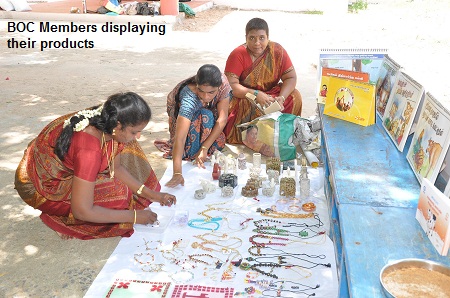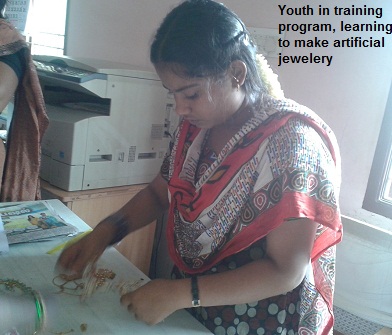LIVELIHOOD

CARE India focuses on empowering women and girls from the poor and marginalized communities by equipping them with required skills, facilitating access to resources, markets and services and by influencing systems, processes and policies.
CARE’s approach towards women empowerment involves the triad of agency, structure and relations. While the programs of CARE strive to address all the three aspects in the triad, a majority of the traditional approach focused on agency, which relates to building skill sets of women. These include multivariate skills such as leadership, management, production, marketing and communication. In order to advance women empowerment, it requires working with the environment (structure) that conditions her choices and the power relations (relations) through which she negotiates her path, apart supporting her in achieving her aspirations and improved capabilities.

CARE in Tamil Nadu has been implementing a number of programs to improve livelihoods and economic empowerment of women. These include a number of value chains in sub-sectors such as tea, dairy, goat rearing, cashew processing, and mud crab fattening in the farm and allied sectors. Most of them focused on building the skills of women to become entrepreneurs or gainfully employed.
The tea value chain initiative supported 1000 primitive tribal women to improve their skills in tea production and to enhance their adaptive skills to cope with climate change. The dairy value chain initiative presently being implemented supports more than 2000 women become dairy entrepreneurs, many of them being first-time entrepreneurs. This initiative supports in building their skills in production, collectivization, marketing and enterprise. Many women have even challenged the gender stereotypes and have ventured into enterprises that are traditionally considered to be male bastion. In cashew processing, CARE supports about 210 cashew processing enterprises to advance women leadership.
In the rural, coastal, semi-urban context, CARE has supported more than 35,000 women to have financial literacy skills; additionally about 4000 women to have life skills and employability skills; and 4000 women to have entrepreneurship skills. CARE has supported more than 1500 women to gain vocational skills in sectors such as tailoring, beautician, artificial jewellery, cloth bag making, soft fashion bag making and toys making, all of which have potential to generate gainful employment opportunities for them.
Entrepreneurship Skills – The training focusses on building the entrepreneurial skills of women. There is an exclusive curriculum to enable them with entrepreneurial skills which involves both start-ups and growing the existing enterprises.
Employability Skills – Women are provided vocational skill training in diverse sectors that offer potential for gainful employment. Along with this, ‘Life skills’ are also covered through an exclusive curriculum to make women job-ready. The approach engages employers and sector associations to link and match skills in a wide range of sectors like agriculture, services and manufacturing aiming at creating demand-led skills systems. Youth mela and job fairs are tried as a strategy to bring together both job seekers and job providers. CARE also facilitates motivational programs in the form of ‘youth melas’, orientation programs, interface meetings with potential employers to enable women find decent jobs.
In facilitating these, CARE has worked with a number of stakeholders including skill development agencies, academic institutions, and banks and leveraged resources to help women build their skills and move up in the value chains. Skill building helps women lead enterprises and make them job-ready in seeking decent employment. New skills give women power to better negotiate her path towards empowerment.




